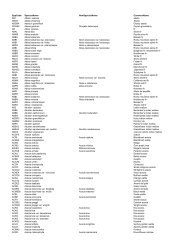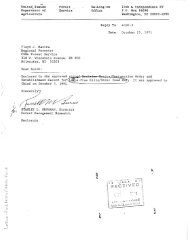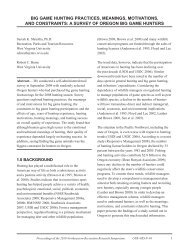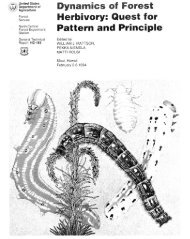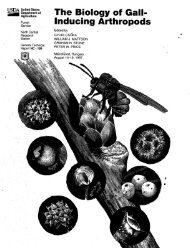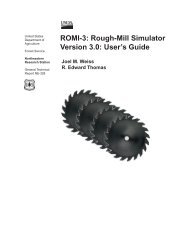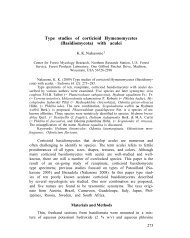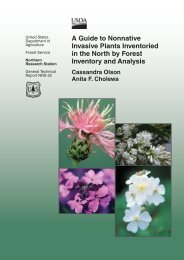Proceedings of the 2009 northeastern recreation research symposium
Proceedings of the 2009 northeastern recreation research symposium
Proceedings of the 2009 northeastern recreation research symposium
You also want an ePaper? Increase the reach of your titles
YUMPU automatically turns print PDFs into web optimized ePapers that Google loves.
LEISURE RESOURCEFULNESS AS A PREDICTOR OF LEVEL OF AFFLUENCE<br />
AND LIFE SATISFACTION: HAVING MORE OR DOING WITH LESS<br />
Jerry L. Ricciardo<br />
Eastern Michigan University<br />
College <strong>of</strong> Health and Human Services<br />
Abstract.—Th is <strong>research</strong> examines <strong>the</strong> role <strong>of</strong> affl uence<br />
in guiding lifestyle orientation in contemporary society.<br />
Th e term “affl uenza” is used to denote a lifestyle <strong>of</strong><br />
consumption and materialism to achieve life satisfaction.<br />
Th e counter to affl uenza is quality <strong>of</strong> life as manifested<br />
in self-improvement, community centeredness, and<br />
environmental stewardship. Leisure resourcefulness is<br />
knowing how and being able to make a meaningful<br />
life for oneself within <strong>the</strong> individual, cultural, and<br />
environmental constraints. Measures <strong>of</strong> affl uenza, leisure<br />
resourcefulness, and life satisfaction are examined for<br />
<strong>the</strong>ir interrelationships and implications for individual<br />
lifestyles and quality <strong>of</strong> life.<br />
INTRODUCTION<br />
Since <strong>the</strong> late 1800s, <strong>the</strong> primary guiding principle <strong>of</strong> <strong>the</strong><br />
<strong>recreation</strong> movement has been to promote <strong>the</strong> welfare<br />
<strong>of</strong> individuals through participation in wholesome<br />
<strong>recreation</strong> activities. Th e National Recreation and Park<br />
Association (NRPA) acquired <strong>the</strong> rights to use <strong>the</strong> slogan<br />
“Life. Be in it” from Australian Limited, a nonpr<strong>of</strong>i t<br />
health and fi tness organization, and used <strong>the</strong> slogan<br />
from 1978 through 1985 to encourage participation in<br />
active lifestyles (Bill Beckner, NRPA Research Manager,<br />
personal communication, 14 December <strong>2009</strong>). Th e<br />
NRPA also works to promote environmental awareness,<br />
community wellness, cultural understanding, and selfempowerment.<br />
Leisure, however, has become a casualty <strong>of</strong> prosperity as<br />
many citizens <strong>of</strong> industrialized nations, and Americans<br />
in particular, are caught up in a culture <strong>of</strong> materialism<br />
and consumerism. Instead <strong>of</strong> <strong>of</strong>f ering time <strong>of</strong>f for a job<br />
well done, employers <strong>of</strong>ten <strong>of</strong>f er more money (bonuses),<br />
which can be used to acquire yet more material<br />
possessions. A work ethic guided by <strong>the</strong> nobility <strong>of</strong> work,<br />
social recognition via promotions at work, and displays<br />
<strong>of</strong> wealth by conspicuous consumption is reinforced by<br />
more work and more consumption. Th e leisure ethic <strong>of</strong><br />
seeking free-time experiences that include high-quality<br />
environmental settings, cultural enhancement, and selfenrichment<br />
is relegated to secondary status. Shor (1991)<br />
advocated adopting a non-consumptive mentality—that<br />
is, doing with less.<br />
DeGraaf and colleagues (2005) state that American<br />
society is infected with a socially accepted virus called<br />
“affl uenza,” defi ned as “a painful, contagious, socially<br />
transmitted condition <strong>of</strong> overload, debt, anxiety, and<br />
waste resulting from <strong>the</strong> dogged pursuit <strong>of</strong> more” (p.<br />
2). Th e authors go on to say that affl uenza is a bloated,<br />
sluggish, and unfulfi lled feeling that results from eff orts<br />
to keep up with <strong>the</strong> Joneses; it is an epidemic <strong>of</strong> stress,<br />
overwork, waste, and indebtedness caused by <strong>the</strong> pursuit<br />
<strong>of</strong> <strong>the</strong> American Dream, an unsustainable addiction to<br />
economic growth.<br />
Th e term was popularized in <strong>the</strong> United States in 1997<br />
by <strong>the</strong> television documentary titled, “Affl uenza: Th e All-<br />
Consuming Epidemic,” produced by John DeGraaf and<br />
broadcast by KTCS and Oregon Public Broadcasting.<br />
Th e analysis includes such questions as, “What choices<br />
did we make as a society (between free time and ‘stuff ,’<br />
for example) that deepened our infection?” (DeGraaf et<br />
al. 2005, p.5). To cope with <strong>the</strong> epidemic, <strong>the</strong> authors<br />
encourage a “new frugality and voluntary simplicity”<br />
(DeGraaf et al. 2005, p. 6) or doing with less—that<br />
is, choosing time instead <strong>of</strong> more money. Th e authors<br />
state that shopping has become a national pastime; 93<br />
percent <strong>of</strong> teenage American girls state that shopping is<br />
<strong>the</strong>ir favorite <strong>recreation</strong> activity (DeGraaf et al. 2005,<br />
p. 15). Shopping at malls is accompanied by shopping<br />
by catalog, by TV, or online, usually with one <strong>of</strong> 6.5<br />
credit cards, <strong>the</strong> average number <strong>of</strong> credit cards owned<br />
by Americans (DeGraaf et al. 2005, p. 19). Th e result<br />
<strong>of</strong> this consumption frenzy is material overload, debt,<br />
a shortage <strong>of</strong> time for nurturing human relationships<br />
(a harried leisure class), a leng<strong>the</strong>ning work schedule,<br />
stress from overload and anxiety, lack <strong>of</strong> sleep, obesity,<br />
depression, a decrease in social capital that binds<br />
<strong>Proceedings</strong> <strong>of</strong> <strong>the</strong> <strong>2009</strong> Nor<strong>the</strong>astern Recreation Research Symposium GTR-NRS-P-66<br />
265




